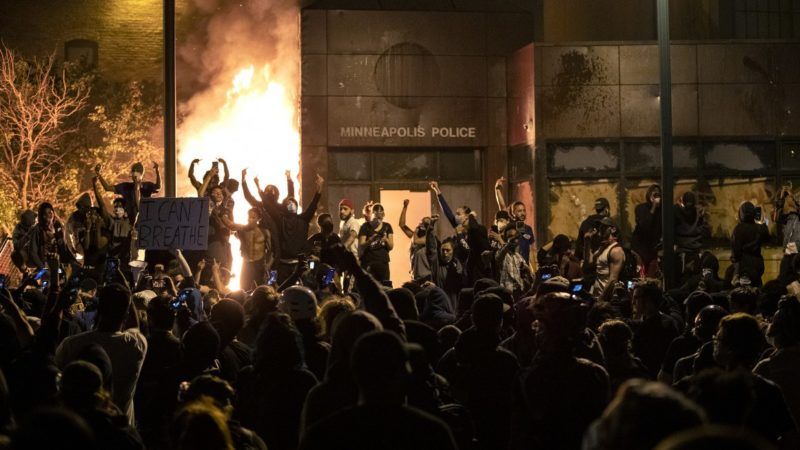Even Police Unions Trash the Actions of the Cop Who Killed George Floyd
Are we seeing a tipping point where police begin to grasp why the public is so outraged?

After New York City Police Department (NYPD) officer Daniel Pantaleo was videotaped confronting and choking Eric Garner to death in 2014, public outrage over what had happened was fueled in part by defiant police unions in the city who refused to consider the possibility that Pantaleo's conduct was unacceptable and unnecessary.
Even after Panatleo's eventual termination—which only happened five years later—organizations like the Police Benevolent Association took Pantaleo's side, calling for work slowdowns (which backfired as crime continued to decline in New York City without their help). The unions generally acted like both mayor and police commissioner had betrayed the police by holding an officer responsible for killing somebody under circumstances in which it was completely unnecessary to protect public safety.
This has long been typical police union behavior, which makes some of the union responses to the death of George Floyd in Minneapolis on Monday surprising. Police unions are coming forward not to defend Derek Chauvin, the police officer who pressed his knee on Floyd's neck for nearly eight minutes, but to agree that Chauvin's behavior was inappropriate and unacceptable.
Last night, police officer associations for San Francisco, San Jose, and Oakland, California, put out a joint statement about Floyd's death:
"What we saw in the video was inconsistent and contrary to everything we have been taught, not just as an academy recruit or a police officer, but as human beings. Reverence for life in every incident a police officer encounters must be the floor and not the ceiling. … We are equally disturbed by not seeing any of the other officers on scene intervene to prevent this tragedy."
Nashville's chapter of the Fraternal Order of Police described the treatment of Floyd as "indefensible actions [that] violated the oath and tarnished the reputation that the brave men and women of law enforcement have worked so hard to attain."
The president of the national Fraternal Order of Police, Patrick Yoes, has even come forward and, in a bit more of a circumspect fashion, declined to defend Chauvin's actions.
"Based on the by-stander's video from this incident, we witnessed a man in distress pleading for help," Yoes said in a statement. "The fact that he was a suspect in custody is immaterial—police officers should at all times render aid to those who need it. Police officers need to treat all of our citizens with respect and understanding and should be held to the very highest standards for their conduct."
Police chief associations and individual chiefs have also been denouncing Chauvin's treatment of Floyd, though that's slightly less surprising. While some chiefs choose to give cover to bad cops, some others (particularly in larger cities) are more than willing to fire them, only to have their actions overruled by appeals processes (pushed by and heavily controlled by police unions, in many cases) that put these officers back on the force, often against a police chief or sheriff's will.
So far, the Police Officers Federation of Minneapolis appears to be taking a diplomatic route, simply stating, "Officers' actions and training protocol will be carefully examined after the officers have provided their statements," and asking people not to rush to judgment.
It's worth noting as a positive that police unions are looking at Floyd's death and seeing what a lot of the rest of us see. Maybe this will be an opportunity for them to reflect more on the public outrage surrounding previous killings by cops as well.


Show Comments (176)